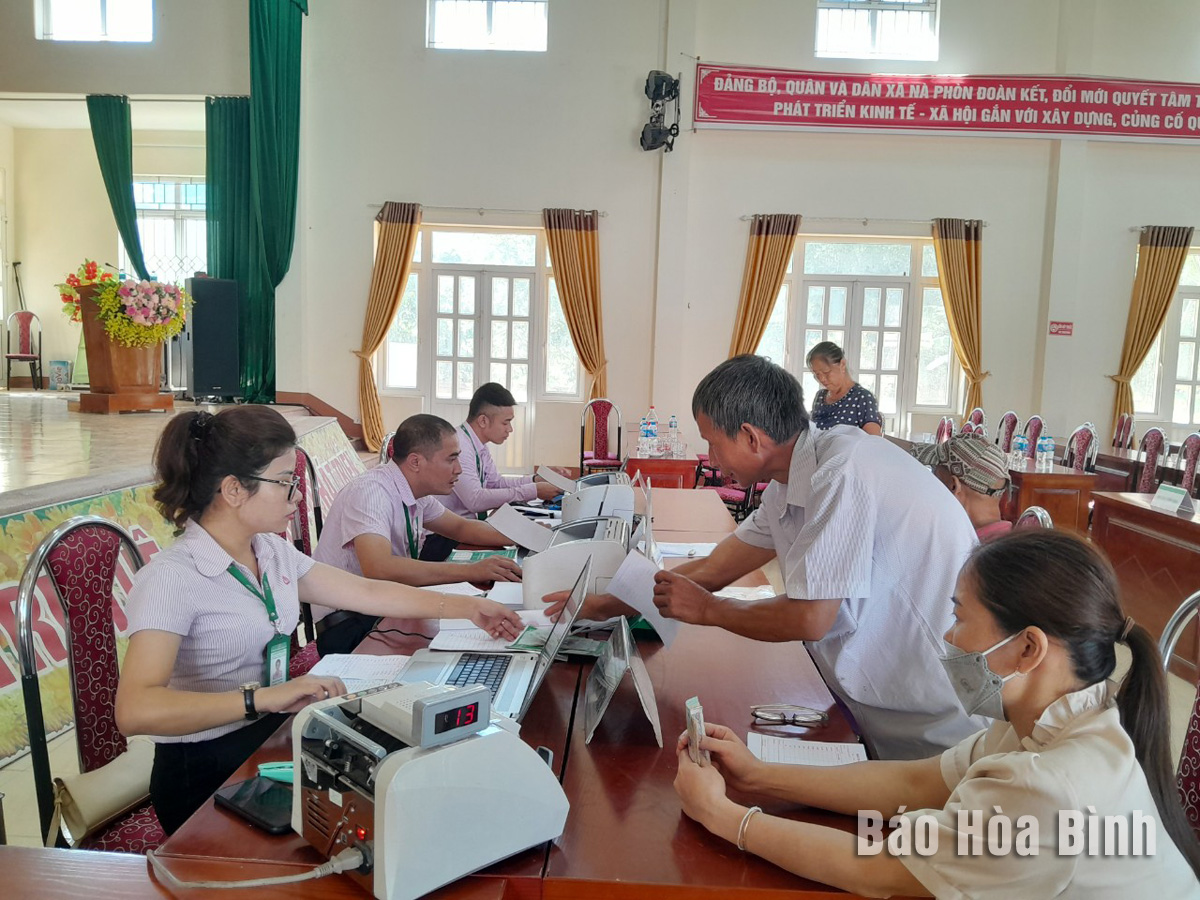
Decree No. 28/2022/ND-CP of the Government on preferential credit policies to implement the national target programme for socio-economic development in mountainous and ethnic-inhabited areas for the 2021 - 2030 period (Phase I from 2021 – 2025) is opening up opportunities to improve the lives of people in these areas in Hoa Binh province in general and Mai Chau district in particular. Since the decree was issued, the transaction office of the Vietnam Bank for Social Policies in Mai Chau district has closely coordinated with local authorities at all levels to drastically direct the review and approval of lists of beneficiaries, and disburse loans.

Staff of the Vietnam Bank for Social
Policies’ transaction office in Mai Chau district conduct procedures to
disburse capital to people in Na Phon commune.
Mua A Trang, Pa Hang Lon hamlet, Pa Co
commune, shared: "My family has six members, the whole family only
depended on 2,000 m2 of hill land to grow maize, even though we worked hard all
year round, we could not get rid of poverty. In August 2023, after the head of
the savings and loan group disseminated a new loan source according to Decree
No. 28/2022/ND-CP of the Government, my family borrowed 100
million VND (4,100 USD). From this capital, I bought three cows and built a
farm. Currently, family members take turns caring for the cows, because they
are the hope to help my family get rid of poverty in the near future."
From 2022 to the end of October 2023, the
transaction office has disbursed 3.34 billion VND to 43 poor households to
support job change, including 19 in Son Thuy commune, eight in Thanh Son, six
in Cun Pheo, five in Na Phon, three in Pa Co and two in Hang Kia.
Currently, the office continues to
coordinate with relevant agencies, and party committees and authorities at the
commune level to monitor the use of loans, review and prepare lists of
households in need of loans which have sufficient conditions to borrow loans
for the following years, thus contributing to bringing policies into life to
help mountainous and ethnic-inhabited areas to get rid of poverty, change
lives, and actively contribute to the effective implementation of national
target programmes in the district.
The Standing Board of the Hoa Binh provincial Party Committee has agreed in principle on a proposal by the Standing Board of the Party Committee of Hoa Binh city to gather feedback on the city’s 1:2000 zoning plan, which forms part of its broader urban development strategy.
Hoa Binh province has made notable progress in public administration reform and digital government development, with the satisfaction index among citizens and businesses reaching over 84%, according to recent government evaluations.
Thanks to great efforts by local authorities in recent times, the governance and public administration performance of Mai Chau district has been significantly improved.
In the afternoon of June 6, the Party Committee, the People's Council, the People's Committee and the Fatherland Front of Lac Son district solemnly held a meeting to celebrate the 139th anniversary of the district's founding (1886–2025) and the 79th anniversary of the establishment of the district's Party Committee (1946–2025). There was the attendance of Mr. Bui Van Thang, the Vice Chairman of the Provincial People's Council; Mr. Quach Tat Liem, the Vice Chairman of the Provincial People's Committee; Ms. Dang Bich Ngoc, the Deputy Head of the National Assembly Delegation of the province; as well as the former leaders of the province and district through various periods, who are the natives of the district.
Implementing the Politburo’s Resolution No. 57-NQ/TW on breakthroughs in science – technology, innovation, and digital transformation is a golden opportunity for the northern mountainous province of Hoa Binh to renew growth model, improve competitive edge and shorten digital gap.
Resolution 57-NQ/TW, issued by the Politburo on December 22, 2024, identifies sci-tech, innovation, and digital transformation as strategic breakthroughs to build a developed and prosperous nation. In Hoa Binh province, this spirit is not just a slogan, it’s being put into action through concrete initiatives that form a "new development triangle”: digital citizenship, digital economy, and digital administration.



